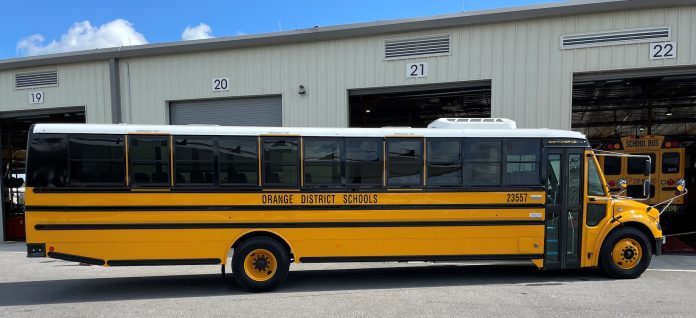Eight years ago, Orange County Public Schools in Florida won a U.S. Department of Education Green Ribbon Schools award. Since then, the district has created a sustainability plan for 2030 that includes reducing transportation emissions.
The U.S. Department of Education recognizes districts each year for their initiative in school sustainability. The program, which has been in place since 2012, is a public engagement initiative structured as a federal recognition award. The U.S. Department of Education Green Ribbon Schools (ED-GRS) honors schools, districts and postsecondary institutions’ cost-saving, health-promoting and performance-enchaining substantiality practices.
Awardees are invited to a ceremony in Washington, D.C., where they receive a plaque and conduct interviews with the media. School districts must apply to their respective state education authorities and are then nominated to the ED. State participation is voluntary, and states that do participate are irregular with their nominations. States must submit their nominees each February and awardees are announced in April of the same year. This year’s awardees are expected to be released soon. Next year’s submission date is Feb. 14, 2025.
States can only nominate up to six schools, and at least one must be disadvantaged.
ED-GRS nominees must show progress in each of the program’s “Three Pillars:”
- Reducing environmental impacts
- Improving health and wellness
- Offering effective environmental and sustainability education.
Andrea Suarez Falken, special advisor for infrastructure and sustainability for the Office of Communications and Outreach at the ED, added that Pillar 1 requires that applicants address transportation, though how they address it varies by state and applicant. Transportation could consist of using routing software, participation in a Safe Routes to School program, and deploying zero- or low-emissions school buses.
As of this year, ED-GRS had recognized 767 honorees, consisting of 584 schools, 118 districts and 65 postsecondary institutions. Each year a significant portion (40 to 70 percent) of awarded districts and schools are located in disadvantaged communities.
School Transportation News spoke with some district awardees to learn more about their sustainability programs and how transportation plays a role. STN is highlighting four ED-GRS winners throughout the week, in honor of Earth Day.
2016 – Orange County Public Schools, Florida
OCPS in Florida, the ninth-largest school district in the nation, won the ED-GRS award in 2016. It was recognized for its sustainable school facilities as well as its Green Schools Recognition program, among other achievements. Eight years later, the district continues to focus on sustainability. The OCPS Sustainability Plan 2030 helps to inspire action among staff and students to improve the environment, reduce district costs and make a positive social impact in the community.
Bill Wen, senior director of transportation services, said staff review key performance indicators with area transportation managers to reduce unnecessary bus idling, as well as use routing and GPS software programs to create the most efficient routes. OCPS is also investing in newer diesel school buses that have better fuel mileage/lower emissions while also piloting electric school buses.
The OCPS Sustainability Plan 2030 outlines transportation goals, which include increasing the number of electric school buses, increasing the number of electric or hybrid vehicles, increasing the number of chargers, reducing idling time and fuel consumption, and conducting sustainable transportation lessons.
“With our GPS software, we provide the area transportation managers the idle reports so they can speak to the drivers about why they were parked and had their buses idling,” Wen said. “In addition to adding pollutants into the air, excessive idling increases our fuel costs and adds wear and tear to the diesel engines.”
He added that the district already operates a three-tier bell time schedule in the morning and afternoon. Wen noted that OCPS also established a 10-year school bus replacement plan and plans to replace 10 percent of its fleet annually.
“This allows us to have newer buses with improved fuel mileage that meet tougher emission standards and saves on maintenance operating costs as the buses are under warranty,” he said.
Related: Florida Student Killed After Crawling Under School Bus He Just Exited
Related: Florida Woman Convicted of 2021 Death of Girl at School Bus Stop
Related: Electric School Bus Webinars Scheduled for This Summer
Related: DERA Tribal and Territory Grants Coming Soon
Related: Innovator of the Year Talks School Bus Charging Solutions
Plus, with the availability of grants, OCPS piloted six electric school buses in 2019 to determine if the vehicles meet operational needs. Wen said that based on the “limited driving range between chargers and cost of the infrastructure,” the district is figuring out on what routes the buses will work best and what cost savings would look like.
This, year OCPS was also awarded $5 million from the U.S. Environmental Protection Agency Clean School Bus Program grant, which fund the purchase of 20 more electric school buses and infrastructure for two more compounds.
“We worked closely with our environmental compliance & sustainability, facilities, grants, and procurement departments to make this happen,” Wen said, adding that OCPS serves an area of over 900 square-miles. “We have seven locations strategically placed in Orange County to reduce the number of miles driven without students. Our facilities department play a huge role in helping us determine which areas will have the largest growth.”
Wen noted that OCPS built a new transportation facility in 2019, with many energy efficient design features. He added the district is considering electric vehicles, cars and trucks to replace district support vehicles.














